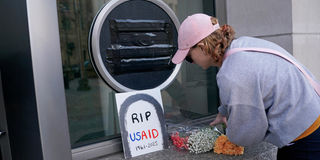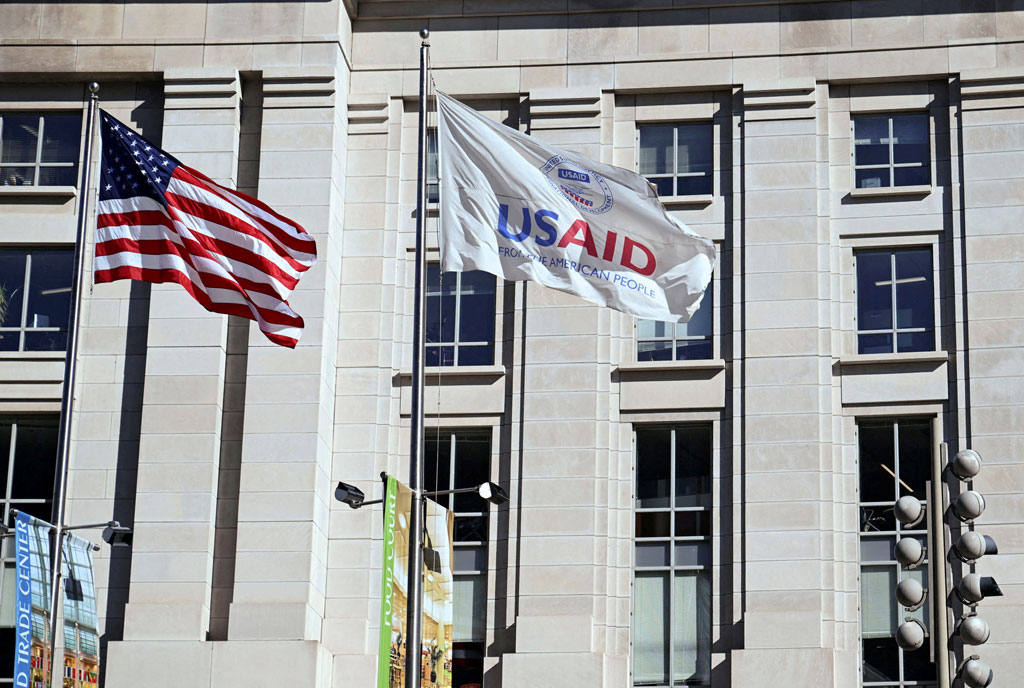'Total panic' as USAID cuts jobs from Syria to Haiti

A person leaves flowers, next to a USAID sign which is covered over, at the agency's headquarters in Washington, US, February 7, 2025.
What you need to know:
- Trump's 90-day suspension of foreign aid sent shockwaves around the world, leaving millions of people without life-saving support, but also hundreds of thousands without jobs.
For almost five years, Sumaya's work as a psychologist at a charity-run clinic in northwest Syria offered a lifeline to the many people scarred by the country's 14-year civil war.
She counselled patients depressed and suicidal after years in displacement camps, or traumatised by the conflict.
But everything changed on January 20 when US President Donald Trump abruptly halted the aid that funded the clinic in the town of Sarmada.
Within days, the clinic, operated by the French charity Doctors of the World, closed its doors, leaving Sumaya, who asked for her surname not to be published, and her 19 colleagues without jobs.
"I was extremely shocked. I didn't know what to say to my family when I returned after hearing the news," Sumaya, the sole provider for her three children and elderly parents, told the Thomson Reuters Foundation by phone.
"I am trying to apply for other work, but there are thousands like me in the same position and no jobs. Soon, I won't have enough for basics and medicines for my parents," added the 40-year-old widow who was earning $700 (Sh89,950) a month.
Trump's 90-day suspension of foreign aid sent shockwaves around the world, leaving millions of people without life-saving support, but also hundreds of thousands without jobs.
From Haiti and El Salvador to Nigeria, Kenya, Syria and Afghanistan, the Thomson Reuters Foundation interviewed administrators, counsellors, midwives, vaccinators, gender and migration specialists, all hit by job losses due to the freeze.
Hakan Bilgin, head of Doctors of the World Turkey, said the charity received 60 percent of its funding from USAID.
He said the aid freeze had forced the organisation to close 12 of 17 of its primary health care clinics in Syria, and end the contracts of 280 of its 350 staff.
"All our staff are Syrian nationals and the majority of them have been displaced for years since the war has started. Without these salaries, it will worsen the crisis," said Bilgin.
Foreign aid shakeup
The United States is the world's biggest foreign aid donor.
In 2023, the U.S. Agency for International Development (USAID) spent $42 billion (Sh5.4 trillion) to support programmes - ranging from malaria and HIV prevention, to fighting starvation and providing shelters for people displaced by war - across 157 countries.
Trump began dismantling USAID last month, saying it was run by "radical left lunatics" and was wasting billions of dollars of taxpayers' money.
Billionaire Elon Musk's Department for Government Efficiency has also put thousands of USAID staff on leave, despite union lawsuits against the move.
In Haiti's capital Port-au-Prince, Jenny, an aid worker with a women's rights advocacy group lost her job last month, and is concerned the programme will not resume after the 90-day review.
The programme, which seeks to empower women, has put more than a dozen people out of work.
"Actually it's total panic in the organisation," said Jenny, who asked for surname not to be used. "People have started worrying whether they will be able to feed their families."
No school, more debt
Many aid workers said they were now having to make drastic cutbacks in order to make ends meet.
Some said they had taken out loans, others said they had stopped buying expensive foods such as fruit and meat, and even withdrawing children from school as they could not pay the fees.
"How can it be that USAID staff are being put on leave and still getting salaries, but we were just told to go home and pray and see what happens in 90 days?" asked a 37-year-old community health worker in Nairobi who did not want to be named.
"The way this whole thing has been done is not fair. We have children to feed and send to school," she said.
In many countries, aid workers said there were few opportunities for even the most skilled professionals.
"Most young professionals have lost their jobs," said Maryam, a 27-year-old midwife who worked at a health charity in the southeastern province of Paktika. "Whenever a job opportunity is announced, hundreds of applicants apply," she said, adding she had a family of 12 to look after.
In Nigeria, the funding freeze has led to massive layoffs of consultants and at NGOs, and dealt a hammer blow to HIV services, 90% of which were funded by USAID.
The Nigerian government has said it will set aside $200 million to plug treatment gaps and also recruit 28,000 health workers laid off by the USAID freeze.
Nixon Ayuba, project manager for the charity Alliance for Health and Rights Advancement Initiative in the northern state of Adamawa, said 10 mental health counsellors, including himself, had been laid off.
Ayuba fears people in drug rehab could relapse, worsening the mental health crisis in a region plagued by Islamist insurgents.
"I am not thinking of myself alone, but also of the young Nigerians who, without our services, will be lost. I hope the U.S. government is thinking of them when they make a final decision," he said.





